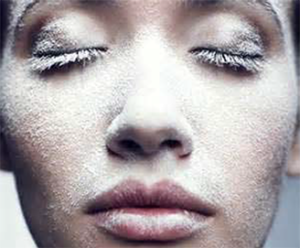Eye Health,Uncategorized,What's New
 Dry eyes affect nearly everyone, and it is no secret that the cold, dry air of our Canadian winters do not really help dry eye symptoms. When it comes to the chilling affects of the colder months, many suffer from irritated, dry or tearing eyes. Being exposed to the harsh winter winds outside and the dry heat radiating indoors can often reak havoc on our poor eyes as both of these atmospheres cause a sudden evaporation of moisture from the inside of our eyes and our tear glands cannot produce fluid quickly enough to replace the protectice, liquid coating that our eyes need to stay hydrated. This leads to dry, itchy eyes that can cause pain, blurred vision, watery eyes or even a burning sensation.
Dry eyes affect nearly everyone, and it is no secret that the cold, dry air of our Canadian winters do not really help dry eye symptoms. When it comes to the chilling affects of the colder months, many suffer from irritated, dry or tearing eyes. Being exposed to the harsh winter winds outside and the dry heat radiating indoors can often reak havoc on our poor eyes as both of these atmospheres cause a sudden evaporation of moisture from the inside of our eyes and our tear glands cannot produce fluid quickly enough to replace the protectice, liquid coating that our eyes need to stay hydrated. This leads to dry, itchy eyes that can cause pain, blurred vision, watery eyes or even a burning sensation.
Unfortunately, it may not be possible to avoid the problem of dry eyes in the winter months altogether; but there are several steps that you can take to ensure that your eyes stay as hydrated and healthy as possible this winter:
- Use artificial tears or gels
Artificial tears or gels can be a great solution to the discomfort caused by winter dry eyes. Make sure you choose a formula that restores moisture to the eyes, and not one that just removes redness. You can even talk to your doctor or pharmacist to find out the best drops for you. - Use warm compresses or store-bought medicated lid wipes
Placing a warm cloth over your eyes, at least two times a day, can often provide relief from dry eyes. You can also try store-bought wipes that contain ingredients to gently clean and moisturize the eyes. - Reduce contact lens wear
Contact lenses can be very drying on their own, even without the winter winds. Thus, wearing your glasses more often will help minimize the drying effect of contact lenses. If you do want to wear your contact lenses, try using contact lens-compatible eye drops that will help lubricate your eyes even when wearing lenses. - Use eye protection
Wearing eye protection, such as wrap-around googles or sunglasses, is also beneficial as it
will reduce the impact of cold, drying winter winds on your eyes. Choose a frame that fits close to your face, whihc will keep dust and other particles out of the eyes. This is especially iportant when enjoying winter sports, such as skiing or other outdoor activities. - Humidify your home
One of the best ways to decrease the effects of dry heated indoor air is to install a humidifier in your home. This will ensure the air in your room contains moisture, which will help to maintain sufficient lubrication in your eyes. - Stay hydrated
Dehydration is one of the major causes of dryness in our bodies, including our eyes. This is especially significant in the winter as the cold temperatures can dampen the body’s thirst mechanism, while atifical heat and cold winds can speed up evaoporation of tears. As a result, keeping the body hydrated with water and fluid-rich foods, like soup and hot tea, can help reduce dry eye symptoms. - Increase your Omegas
One of the best ways to decrease inflammation in the eyes’ tear glands is to consume omega-3 fatty acids. If your diet is low in this nutrient, try taking a fish oil supplement, which will help increase the tears in your eyes. - Don’t blast the heat in the car
In the cold winter months, we all tend to blast the heat in our cars until the vehicle and our bodies warm up. However, sitting infront of a air vent means that your eyes are being blasted with hot hair, which evaporates all moisture, leading to dry, irritated eyes. Try heating your feet or tur on your seat warmers instead.
